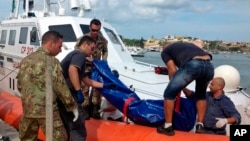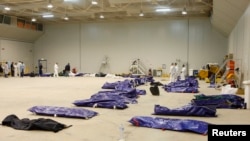GENEVA, SWITZERLAND —
United Nations agencies are calling for international action to crack down on traffickers and smugglers following Thursday’s Lampedusa boat tragedy. The U.N. refugee agency says the disaster, which reportedly has claimed hundreds of lives, should serve as a wake-up call to do more to protect the victims.
Survivors of the Lampedusa tragedy said around 500 Eritreans left from Libya 13 days ago. Some 111 bodies have been recovered and divers are continuing to search for an estimated 200 people who remain missing.
While Italy is mourning the dead, authorities and aid agencies on Lampedusa are focusing on helping the survivors. U.N. refugee agency spokeswoman Melissa Fleming said 155 people reportedly have survived. She said all wee Eritreans, with the exception of a Tunisian man believed to be one of the smugglers. She said Italian police have arrested him.
Among the survivors are 40 unaccompanied boys aged between 14 and 17 and six women. Fleming said they were exhausted and in a state of shock. She said the survivors have been moved to a nearby reception center. She said the center was overcrowded as it held 1,000 people who recently arrived on other smugglers’ boats.
“There are Syrians there. There are Palestinians there and there are some Africans there. We are going to be meeting with the survivors of the accident today. And, as part of UNHCR’s role, we will be advising them on asylum procedures. We have additional staff arriving this morning. IOM (International Organization for Migration) colleagues are also helping out and the Red Cross is providing psychological support to the traumatized survivors,” said Fleming.
Survivors reported the engine of their boat stopped as they were approaching the Italian coast early Thursday morning. They said several fishing boats passed them by without offering help before the Italian Coast Guard came to their rescue.
The U.N.’s human rights office said boats that did not answer distress calls at sea are breaking the International Law of the Sea. The agency is appealing to the Italian authorities and the International Community, especially the European Union to do more to prevent a repeat of this situation.
U.N. High Commissioner for Human Rights Navi Pillay said she was concerned about the increasing rates of smuggling and trafficking of migrants and refugees in the Mediterranean and in the Gulf of Aden. Her spokesman, Rupert Colville, said this indicates the desperation of people living in Eritrea, Somalia and other countries stricken by insecurity and conflict.
“It is critical that the international community engages further in improving the human rights situation on the ground so as to address the root causes and create sufficient improvement so that people will not feel the need to put their lives at risk by undertaking such dangerous journeys,” he said.
The International Organization for Migration reports at least 20,000 people have perished at sea over the past two decades. This year’s toll is 100, not including the victims from this latest tragedy. The IOM said people paid smugglers between 1,200 and 2000 euros to be taken from Libya to Italy in rickety fishing boats-a trip that often ends in disaster.
Survivors of the Lampedusa tragedy said around 500 Eritreans left from Libya 13 days ago. Some 111 bodies have been recovered and divers are continuing to search for an estimated 200 people who remain missing.
While Italy is mourning the dead, authorities and aid agencies on Lampedusa are focusing on helping the survivors. U.N. refugee agency spokeswoman Melissa Fleming said 155 people reportedly have survived. She said all wee Eritreans, with the exception of a Tunisian man believed to be one of the smugglers. She said Italian police have arrested him.
Among the survivors are 40 unaccompanied boys aged between 14 and 17 and six women. Fleming said they were exhausted and in a state of shock. She said the survivors have been moved to a nearby reception center. She said the center was overcrowded as it held 1,000 people who recently arrived on other smugglers’ boats.
“There are Syrians there. There are Palestinians there and there are some Africans there. We are going to be meeting with the survivors of the accident today. And, as part of UNHCR’s role, we will be advising them on asylum procedures. We have additional staff arriving this morning. IOM (International Organization for Migration) colleagues are also helping out and the Red Cross is providing psychological support to the traumatized survivors,” said Fleming.
Survivors reported the engine of their boat stopped as they were approaching the Italian coast early Thursday morning. They said several fishing boats passed them by without offering help before the Italian Coast Guard came to their rescue.
The U.N.’s human rights office said boats that did not answer distress calls at sea are breaking the International Law of the Sea. The agency is appealing to the Italian authorities and the International Community, especially the European Union to do more to prevent a repeat of this situation.
U.N. High Commissioner for Human Rights Navi Pillay said she was concerned about the increasing rates of smuggling and trafficking of migrants and refugees in the Mediterranean and in the Gulf of Aden. Her spokesman, Rupert Colville, said this indicates the desperation of people living in Eritrea, Somalia and other countries stricken by insecurity and conflict.
“It is critical that the international community engages further in improving the human rights situation on the ground so as to address the root causes and create sufficient improvement so that people will not feel the need to put their lives at risk by undertaking such dangerous journeys,” he said.
The International Organization for Migration reports at least 20,000 people have perished at sea over the past two decades. This year’s toll is 100, not including the victims from this latest tragedy. The IOM said people paid smugglers between 1,200 and 2000 euros to be taken from Libya to Italy in rickety fishing boats-a trip that often ends in disaster.





